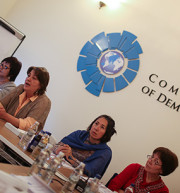
(Click here for English) ЖЕНЕВА - Специальный докладчик ООН Майна Киаи посетит Казахстан с 19 по 27 января 2015 года, чтобы дать оценку осуществлению прав на свободу мирных собраний и свободу объединения в стране. Это первый визит в Казахстан независимого эксперта, мандат которого в соответствии с резолюцией Совета ООН по правам человека заключается в отслеживании и продвижении права на свободу мирных собраний и свободу объединения в мире. "Право на свободу мирных собраний и право на свободу объединения являются важным компонентом демократии и развития, и государства обязаны в полной мере уважать и защищать эти права", - заявил независимый эксперт. "В ходе визита я ознакомлюсь с установленными законом требованиям к... Continue reading →

(ру́сский язы́к) GENEVA – United Nations Special Rapporteur Maina Kiai will visit Kazakhstan from 19 to 27 January 2015 to assess the enjoyment of the rights to freedom of peaceful assembly and of association in the country. Mr. Kiai’s visit is the first information-gathering mission to Kazakhstan by an independent expert tasked by the UN Human Rights Council to monitor and promote the rights to freedom of peaceful assembly and of association worldwide. “The rights to freedom of peaceful assembly and of association are essential components of democracy and development, and States have a duty to fully respect and protect these rights,” the independent expert stated. “During my visit, I will look into both the legal requirements for holding peaceful assemblies, and how peaceful assemblies are facilitated in practice,” he said. “I will look into the issues related to the registration of public associations, trade unions, political parties and religious organizations, as well as on the existence of an enabling environment for the free and effective functioning of civil society.” “I will also gather information on how recently adopted legislation, in particular the new Criminal Code and the Code on Administrative Offences, has impacted the enjoyment of freedom of... Continue reading →

• A day later, Nigeria flip-flops and says no protest ban for #BringBackOurGirls group (Al Jazeera). Earlier: Bring Back Our Girls demonstrations banned for “security reasons” in Abuja, Nigeria. Ban is “insane,” says protest group’s lawyer. (The Telegraph) • Using the ‘Hunger Games’ salute has taken hold as a form of protest in Thailand, after peaceful assemblies were banned. One anti-coup activists calls on people to raise “3 fingers, 3 times a day” to call for political rights (Washington Post). A military spokesman expressed concern: “If it is an obvious form of resistance, then we have to control it so it doesn’t cause any disorder in the country.” (News.com.au) • Amnesty International has released a new report on Russia “onslaught on protest.” Earlier: Human Rights Watch on the effect of Russia’s “foreign agents” law on NGOs. • Also on Russia: Manifesta – the “roving European biennial of contemporary art” – will be held in St. Petersburg this year. Its curator, Kasper König, reflects on the situation in the country: “The ink on my contract was still wet when that appalling anti-gay law was passed. It became clear to me that I was working in a country where there is no civil society.” (DW.de) • Activists launch giant balloons to protest... Continue reading →

(WARSAW, Poland) – Political will is a major obstacle in ensuring civil society’s access to resources in many OSCE countries, according to participants in a May 7 regional dialogue organized in Warsaw by the Community of Democracies and the team of UN Special Rapporteur Maina Kiai. “It’s not a question of convincing through enough human rights laws or standards,” said one participant. Sometimes “they can’t be convinced.” The dialogue was the first event in a new two-year project focused on enhancing space for civil society and strengthening the right to access financial resources. The project was launched in February, and is being funded by the Swedish Ministry of Foreign Affairs. The May 7 Warsaw event looked at international human rights norms, standards and mechanisms to promote the right to freedom of association – and possible ways to strengthen these tools. More than 20 members of civil society from throughout the OSCE region participated. The focus on political will was central to the discussions, with one participant saying that talking about human rights norms to the government in his country was like “talking to the wall.” As a result, the road to ensuring civil society’s access to resources will require creative schemes and new ways of thinking, participants said –... Continue reading →